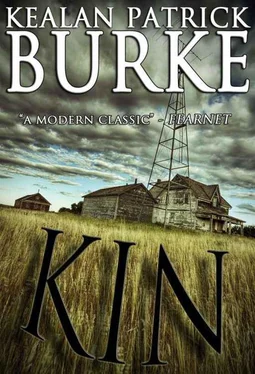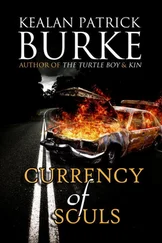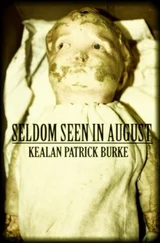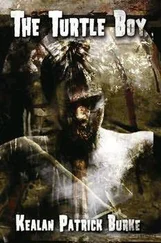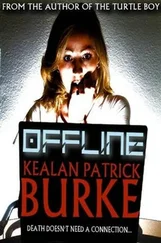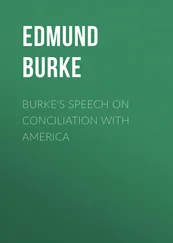“Pa?”
Slowly, so slowly Pete imagined his neck should have creaked like an old door, his father turned his head to look at him. His eyes were like smoked glass, a cold fire flickering beyond them.
“You hush up now,” Pa said. “Need to listen.”
“For what?”
His father sighed, but didn’t reply, then went back to looking at the door with such intensity that Pete found himself checking it himself for something he might have missed all these years—a word, maybe, or a carving or engraving, something that might justify his father’s scrutiny.
“You scared’a somethin’?” he asked then after giving up on the door and focusing instead on his father’s taut, aged face.
He didn’t understand a whole lot about his old man, but figured himself a pretty good judge when it came to moods. Anger was the easiest one of course, given that it was, more often than not, a whole lot of blustering, heavy breathing and cussing, followed by a couple of open-handed smacks across the head if the fault was Pete’s, and a couple of kicks in the ass if it wasn’t. Sorrow was a tougher one, but over the years Pete had learned to recognize that too. He reckoned his Pa had never really gotten over Louise—who Pete considered his second Ma—leaving him, and the boy thought he understood that. Sometimes late at night when he lay in bed, Pete would watch the stars, untainted by city light and sparkling like shattered glass in the moonlight, and go over the constellations in his mind, summoning the memory of her, imagining her there beside him, listing off all the names. Sometimes he imagined so hard he could almost feel her there, could smell that scent which had always brought to mind images of spring flowers and clean laundry as she sat next to him on the bed, her fingers stroking his hair, her other hand on his wrist. There’s Cassiopeia , she would whisper in his ear, looks just like a double-u, see it? And there’s Orion, and those three stars right there, that’s his belt. Up’n the corner, see that one look’s red? And he would nod and wait for an answer that wasn’t coming, because she hadn’t stayed around long enough to offer it, and so there his imagination would falter and the loneliness would rush in like cold water through holes in a sinking ship. But there were always dreams, and in dreams she never left him, was still here cooking mouth-watering food for them, singing with that beautiful voice of hers, and messing around with Pa, who would scowl and look irritated but only because he was struggling not to smile.
It had been a long time since Pete had seen his Pa smile about anything, and he often wondered how much of that was his fault. He knew because he wasn’t all that smart, he wasn’t likely to ever get the kind of job that could give his Pa and him a better life. He wasn’t ever going to be mayor or President or an astronaut like his second Ma had told him he could. She’d said he could be anything he wanted, just like she aimed someday to be a famous singer, but he knew that wasn’t true now, and Pa knew it too, even said as much when he’d had a few days drinking under his belt and didn’t seem to know what he was saying, or that he was saying it out loud. Coulda been somethin’ boy. Coulda been a real man, but you ain’t never gonna amount to nothin’ more than a farmboy with cowshit on your shoes and straw in your head, standin’ at that door waitin for somethin’ better to come along that ain’t never comin’. Not for you, boy, and sure as hell not for me . Pete would listen carefully to his father’s words, and feel the pain that came with them, but told himself Pa was only saying those things out of disappointment and anger, and because it was better to throw mean words at the boy than at his own reflection in the mirror. Pa had wanted a better life too, but as soon as second Ma walked out, bound for Detroit with some man Pete had only seen once, and that by accident, the old man had given up hoping for a future. He had given up, period. The woman he’d loved had left him here with a son that wasn’t of his own blood, a dying farm, and plenty of time to sit and drink and wonder why she’d given up on them.
“I reckon I am,” his father said, in such a low voice that Pete had to strain to hear it, and even then he had to struggle to remember the question his father was answering. His thoughts had set him adrift from their conversation and now he had to search quickly for the thread. He found it as he watched the old man raise the bottle of whiskey and study the remaining dregs.
Pa was afraid, and as it was a state Pete seldom, if ever, saw in him, it had the effect of galvanizing his own discomfort. He stood, shoving the chair back with his knees, and came around the table to stand beside his father. “What’s wrong?” he asked.
The old man lowered the bottle, but kept his eyes on it as he spoke. “I don’t reckon I did much of a job by you,” he said. “Don’t reckon I could even if I tried. My own Pa wasn’t much of a man neither, and never treated me right, though I don’t expect that’s much of an excuse.”
Hearing his father talk of such things disturbed Pete more than the odd silence and the sudden sense that their house had shrunk around them, but he shrugged and forced a smile.
“S’okay, Pa. Don’t nobody know the right way to do everythin’.”
His father considered this. “Maybe that’s true, but there ain’t no excuse for not tryin’.”
“You did try,” Pete told him. “You looked after me pretty good. I ain’t wantin’ for nothin’.”
A small bitter smile twisted his father’s lips. “You wantin’ for plenty, boy. Some of that I can’t do nothin’ about. Some, I reckon I could’ve fixed.”
Pete frowned. “Well…it ain’t too late, Pa. We got time.”
At that, the weak smile vanished from his father’s face. His eyes widened as he glanced from the bottle back to the door. “That’s the trouble, son. I got a feelin’ we don’t.”
* * *
He had promised himself he wouldn’t scare the boy, but after a good deal of thought and a great deal of whiskey, Jack had realized there was no way around it. If the Merrill clan were coming, better Pete know, so he would at least have the chance to run. He set the now empty bottle down between his chair and the fire, and let his hands rest on the polished walnut stock of the rifle. He’d kept the weapon in pretty good shape all these years, better shape than anything else, his son included. Jack was truly sorry for that and he’d meant what he’d told the boy. There was so much else he wanted to say too before time ran out, but no matter what way he came at it, the words wouldn’t come. Even now, with the hounds of hell thundering a path to their door, he couldn’t tell his boy he loved him. And maybe that was because he didn’t. There was no doubt that he cared for Pete, and worried after him constantly, but years of disappointment, self-loathing, and resentment for the child he secretly held accountable for the only two women he’d ever loved abandoning him, didn’t allow those seeds to blossom into a full flower of adoration. In truth, he’d never wanted a kid, and had been doing just fine avoiding the whole problem until he’d met Annabelle, who been nurturing one in her womb. Even so, he’d figured he’d adapt just fine to the role of parent, even if she ended up doing most of the raising. But then she went and died on him soon as that child drew its first breath. For almost fifteen years he wallowed in self-pity and thoughts of up-and-leaving, reasoning that someone would find the kid and take him in, and to hell with whatever they thought of him for deserting it. He was no monster, and it would have been a bald-faced lie if he’d ever claimed he hadn’t taken a shine to the kid. But though on paper it would always say Jack Lowell was a father, he knew in his heart he wasn’t equipped to be one. Someday, he’d known, that kid would wake up and be alone. It would kill him to do it, but staying would be worse for them both.
Читать дальше
